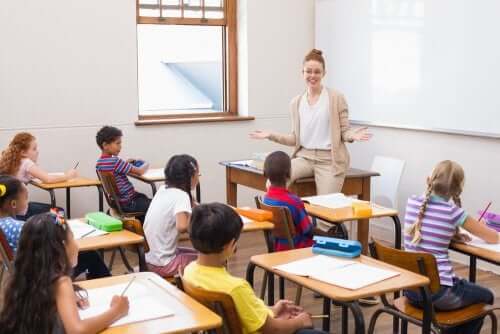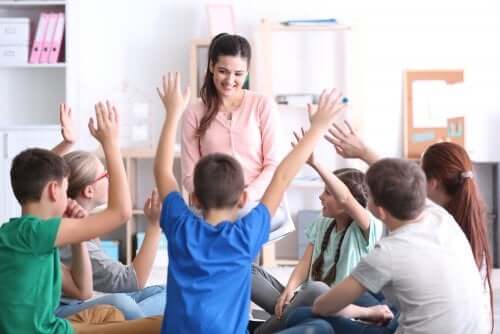The Importance of Using Humor in the Classroom

There’s no doubt that education is very important for society to advance. However, this doesn’t mean it should be serious and stressful. On the contrary, using humor in the classroom has lots of benefits, both for students and teachers.
All of us have had negative experiences at school. Many of us remember the pressure, shame, fear of the teacher, and the heavy atmosphere where we spent most of our days. Fortunately, education models are starting to change. In fact, more and more teachers are striving to make learning a rewarding experience.
Humor is the basis of learning
We can consider humor everything that causes laughter, fun and positive emotions. This includes jokes, games and lots of other stimuli. In fact, humor stimulates our brain reward circuit in a healthy and simple way. This is why children play to discover the world around them.
By playing, they explore, discover and rehearse important behaviors. However, they do it in a relaxed and rewarding way. Therefore, whenever they can, they want to play the game again to re-experience those positive emotions.

It’s clear that the most important lessons only happen when they’re associated with an emotion, and it’s best when it’s pleasant.
Benefits of using humor in the classroom
Reduces stress and increases motivation
The learning process can be tough. Students often face frustrations, failures, boredom and tension. Then, the classroom becomes a stressful environment that causes negative emotions. This can lead to anxiety and depression symptoms at younger and younger ages.
Similarly, teachers are immersed every day in this tense and exhausting environment. Therefore, they can end up suffering from burnout and seeing their moods change too.
Using humor in the classroom helps create a positive and relaxed atmosphere. That way, making mistakes doesn’t mean rejection or humiliation. On the other hand, kids feel pleasant emotions of cooperation and empathy.
Without a doubt, this will help both teachers and students be happier and have a better quality of life. In addition, it will motivate both groups to work in a more enthusiastic way. When learning is enjoyable and fun, when it generates positive feelings, who wouldn’t want to keep doing it?
Relationships to enhance learning
To a large extent, teaching involves social relationships. Teachers need to be able to capture their student’s attention and communicate information. Likewise, peer relationships are also very important. Humor fosters closeness, intimacy and cohesion between people.
The walls fall down and a very nurturing relationship of trust forms. Therefore, thanks to humor, tensions soften, relationships get closer and communication improves. Also, fun information is more attractive. Therefore, kids remember it more easily.

Promote mental flexibility
Aspects like creativity, cognitive flexibility and analytical skills are essential for life. However, schools often have rigid curriculums that don’t let kids actively participate in their education. Therefore, they become passive recipients of information that doesn’t even make them curious.
Using humor in the classroom creates open, flexible minds. It stimulates their divergent thinking skills. It also helps kids see things from other points of view.
What should humor in the classroom look like?
Of course, not just any humor will work. Ridiculing, humiliating or laughing at the expense of someone else will just make people feel suffocated. Humor in the classroom needs to focus on building relationships and learning from mistakes.
Therefore, use jokes that unite the group. Make kids feel like they belong! Encourage a relaxed and positive attitude towards mistakes, seeing them as a natural part of the learning process.
There’s no doubt that education is very important for society to advance. However, this doesn’t mean it should be serious and stressful. On the contrary, using humor in the classroom has lots of benefits, both for students and teachers.
All of us have had negative experiences at school. Many of us remember the pressure, shame, fear of the teacher, and the heavy atmosphere where we spent most of our days. Fortunately, education models are starting to change. In fact, more and more teachers are striving to make learning a rewarding experience.
Humor is the basis of learning
We can consider humor everything that causes laughter, fun and positive emotions. This includes jokes, games and lots of other stimuli. In fact, humor stimulates our brain reward circuit in a healthy and simple way. This is why children play to discover the world around them.
By playing, they explore, discover and rehearse important behaviors. However, they do it in a relaxed and rewarding way. Therefore, whenever they can, they want to play the game again to re-experience those positive emotions.

It’s clear that the most important lessons only happen when they’re associated with an emotion, and it’s best when it’s pleasant.
Benefits of using humor in the classroom
Reduces stress and increases motivation
The learning process can be tough. Students often face frustrations, failures, boredom and tension. Then, the classroom becomes a stressful environment that causes negative emotions. This can lead to anxiety and depression symptoms at younger and younger ages.
Similarly, teachers are immersed every day in this tense and exhausting environment. Therefore, they can end up suffering from burnout and seeing their moods change too.
Using humor in the classroom helps create a positive and relaxed atmosphere. That way, making mistakes doesn’t mean rejection or humiliation. On the other hand, kids feel pleasant emotions of cooperation and empathy.
Without a doubt, this will help both teachers and students be happier and have a better quality of life. In addition, it will motivate both groups to work in a more enthusiastic way. When learning is enjoyable and fun, when it generates positive feelings, who wouldn’t want to keep doing it?
Relationships to enhance learning
To a large extent, teaching involves social relationships. Teachers need to be able to capture their student’s attention and communicate information. Likewise, peer relationships are also very important. Humor fosters closeness, intimacy and cohesion between people.
The walls fall down and a very nurturing relationship of trust forms. Therefore, thanks to humor, tensions soften, relationships get closer and communication improves. Also, fun information is more attractive. Therefore, kids remember it more easily.

Promote mental flexibility
Aspects like creativity, cognitive flexibility and analytical skills are essential for life. However, schools often have rigid curriculums that don’t let kids actively participate in their education. Therefore, they become passive recipients of information that doesn’t even make them curious.
Using humor in the classroom creates open, flexible minds. It stimulates their divergent thinking skills. It also helps kids see things from other points of view.
What should humor in the classroom look like?
Of course, not just any humor will work. Ridiculing, humiliating or laughing at the expense of someone else will just make people feel suffocated. Humor in the classroom needs to focus on building relationships and learning from mistakes.
Therefore, use jokes that unite the group. Make kids feel like they belong! Encourage a relaxed and positive attitude towards mistakes, seeing them as a natural part of the learning process.
All cited sources were thoroughly reviewed by our team to ensure their quality, reliability, currency, and validity. The bibliography of this article was considered reliable and of academic or scientific accuracy.
- Narváez, E. J., & Solís, J. D. F. (2009). Risa y aprendizaje: el papel del humor en la labor docente. Revista interuniversitaria de formación del profesorado, 23(3), 203-215.
- Fernández-Poncela, A. M. (2012). ‘Riéndose aprende la gente’: Humor, salud y enseñanza aprendizaje. Revista iberoamericana de educación superior, 3(8), 51-70.
This text is provided for informational purposes only and does not replace consultation with a professional. If in doubt, consult your specialist.








